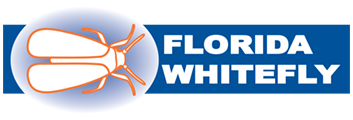Sample Submission
Homeowners, the general public, and landscape professionals may contact their local county extension office for general whitefly identification and management questions. If you would like to submit a sample, be sure to contact your local county extension office for their preferred method of sample submission (either a digital or a physical sample).
Digital Samples
Digital samples consist of a series of images of the pest in question, the damage it has caused, and the host (or hosts) on which it is found. A photograph may be sufficient for pest screening of rugose spiraling whitefly, Bondar’s nesting whitefly, and ficus whitefly in areas with high infestations. Florida’s Distance Diagnostic and Identification System (DDIS) may be used by Florida’s County Extension faculty and other specialists for photo-based communications. University of Florida personnel are then able to communicate with other expertise outside of UF/IFAS to determine the identification or the need for physical sample collection.
Photo-based sample identification is never considered to be a final, confirmatory diagnosis, but photo-based identification may be an essential screening and initial pest identification resource. Additionally, photo-based identification may be accurate for confirming that the damage you are noticing is caused by a whitefly. Assuring that you are experiencing a whitefly problem (compared to other species resembling whitefly or symptoms caused by other organisms) is the most critical component of a management program.
Physical Samples
Physical samples may also be submitted. In the case of whiteflies, adults are not used for species identification. Instead, you need to collect 8 to 12 inches of host material infested with puparia (pupae) for submission. Please double bag your sample, placing a dry paper towel in the bag with the sample to soak up excess moisture. Be sure to keep the sample in a cool place before you submit it as heat will degrade it.
Next, complete the sample submission form for insect pests or the sample submission form for plant pathogens and tape it to the outside of the bagged sample. A sample can be taken directly to the local county agent or it can be mailed to the UF Insect ID Lab or UF/IFAS Tropical Research and Education Center (TREC) Florida Extension Plant Diagnostic Clinic. If you do mail it in directly, please put it in a small box (vs. a padded envelope) as the sample could get crushed in the mail. For best results, please overnight the package.
UF Insect ID Lab
Building 970 Natural Area Drive
Gainesville, FL 32611
352-273-3933
UF/IFAS Tropical Research and Education Center
Florida Extension Plant Diagnostic Clinic
18710 SW 288 Street,
Homestead, FL 33030-2309
305-248-3311
The 3 W's of Sample Submission
![]() Why Submit a Sample?
Why Submit a Sample?
If you are unfamiliar with whiteflies, you might need some help. Once you have a whitefly identified, you will become more familiar with whiteflies and initial pest screening will be easier.
If you have a dead or dying plant, you want to be sure that you are treating the correct problem. Numerous other plant disease and arthropod pressures may cause signs and symptoms similar to whitefly damage.
If you think you have detected Bondar's nesting whitefly, rugose spriraling whitefly, or ficus whitefly outside of its current and known distribution, you need to report it. Knowing if these species are spreading to new areas and noting new host records is important in developing long term control methods for these pests.
If you think that you've detected a new whitefly species, please submit a sample. Whitefly infestations may actually include multiple species of whiteflies.
![]() What to Submit?
What to Submit?
Digital samples should include images of the pest, damage, and host(s).
Double bag physical samples and include the lab's submission form (pest or disease).
![]() Where to Submit?
Where to Submit?
Photographs may be submitted by e-mail to the county extension faculty agent or directly to DDIS. Be sure to check which method is preferred.
Physical samples may be submitted to your local county extension office, the Insect Identification Lab, or UF/IFAS TREC Florida Extension Plant Diagnostic Clinic.
Feel free to direct further questions or urgent concerns to the webmaster or the Florida Department of Agriculture and Consumer Services, Division of Plant Industry's toll-free helpline: 888-397-1517.


